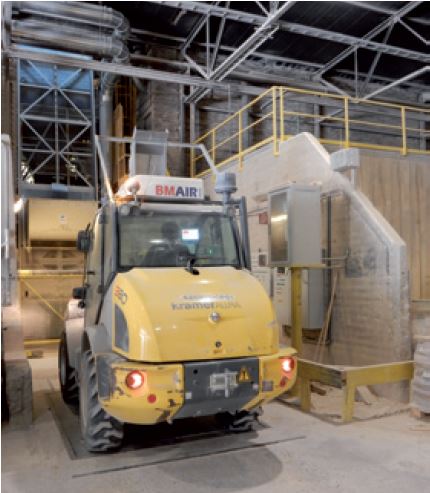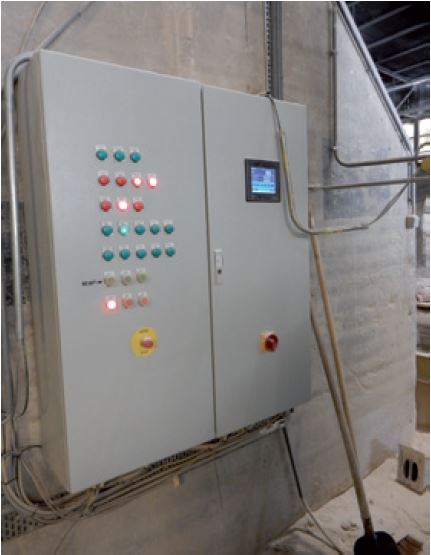For an improvement in the production environment Royal Mosa took
weighing specialist Penko Engineering BV in Ede by the elbow.
The tile
producer can now be sure that all the raw materials of a recipe are
dosed correctly,
while the flexibility of the production is increased.
Royal Mosa, the Maastricht tile
manufacturer, carries an extensive
portfolio of products, for which a range of
raw materials is required. Using any of
these raw materials determines its quality,
and a storage location is assigned. For the
production of a series of tiles, the various
raw materials are retrieved according to
the recipe, weighed and mixed until a
homogeneous mixture. This material is pressed and a pattern foreseen. It can now
be baked into tiles.
Old Method
The correct amounts of raw materials
are essential for the quality of the tiles
to be produced. The old method was
that a shovel removed the materials
from the supply boxes, after which the
load is printed. The weighed load is then
discharged into a loading bucket, which
brings the material to the production
process. The driver receives at the shovel,
on a radio connected display, instructions
for taking the raw materials, while the
floor scale is also equipped with a display.
 Improvement Process
Improvement Process
Improvement in this state of affairs is
related to the large differences in batch
sizes for different tile types, the growing
number of raw materials and the need
to exclude the accidental exchange of
raw materials. Rejection of tiles not only
means loss of raw materials, and
pigments, but also to the detriment of
the durability of the process, in
particular because of the energy that is
required for the milling and baking.
Royal Mosa took specialist Penko
Engineering BV in Ede by the elbow,
because of the experience they have
there with automated processes and
tracking and tracing.
Signal Column
In the meantime, the process up to the
mixer has been updated. All storage
locations for the raw materials are
provided with a signal column. The driver
has a terminal with touch screen on the
shovel in which he is given an overview of
the recipe to be made, a list of all the raw
materials with their locations and the
required weights. On the floor scales, the
driver determines the weight of the shovel
and goes to retrieve the first raw material
from its location. Upon arrival, the color of
the signal column at this location changes
to green. Should the driver accidentally
choose a wrong location, then the signal
column will show red and the driver
receives a warning on his terminal. The
driver will therefore go to the right
location to fill the bucket.
Liberty
Then, the driver drives the raw material
back to the floor scale for weighing and
then dumps the load in the loading
bucket. Then he checks on the floor scale
whether the bucket has been emptied
entirely. If not, then a message follows. If
so, then the weight of the load is
subtracted from the total amount of raw
material. The driver now has the liberty to
choose the same, or a different raw
material from the recipe. The last
weighting of a raw material is decisive for
the attainment of the desired weight, and
is then also controlled on a per material
adjustable tolerance. After this, the
material disappears from the list on the
driver's terminal. Only when all the raw
materials of a recipe have been dosed, can
a new recipe be made. This way of
working has three advantages. In the first
place, it provides the certainty that all the
raw materials are dosed in the right
quantities. Secondly, the system is flexible,
both in terms of batch size, the selection
order of the raw materials as well as the
desired mass. Thirdly, thanks to the weight control, the
system is accurate (up to ± 2 kg).
 Weighing Controller
Weighing Controller
The Weighing controller type FLEX is
selected for the process and signal columns
control. This instrument is freely
programmable, even for an individual
recipe. The number of inputs and outputs,
both digital and analog, can be adapted to
the situation. The terminal in the shovel
communicates via WiFi. For the determination of the position of
the shovel with respect to the storage
location is an RFID transmitter / receiver on the shovel.
Each location has its own RFID tag.
Recipe Management
The PENKO BCS package installed in a
central computer, can manage 100
recipes, each with 31 raw materials. This
package makes it possible to create
production orders and establish tracking
and tracing information. The latter is done
on the basis of the data of the finished
recipes:
- Driver's number
- Name and number of the recipe
- begin date and end time
- destination
- per raw material the time, the chosen and the actual dose weight
Top Layer
Prior to the application of the top layer on
the tiles, Royal Mosa previously added
ready-to-use mixtures. However, it increases
the flexibility of the manufacturing process if
one can make these mixtures themselves.
Thanks to the dosing accuracy of the Penko
systems these mixtures can now be
manufactured in-house. The flexibility of the
Penko systems makes it possible in the
future to effortlessly incorporate changes in
the production process, so Royal Mosa can
move forward with this investment for the
years to come.
Download Article